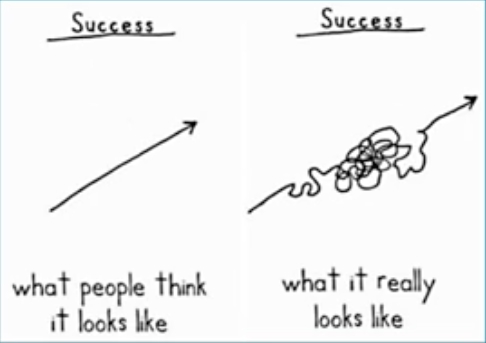“The biggest risk is not taking any risk… In a world that changing really quickly, the only strategy that is guaranteed to fail is not taking risks.” -Mark Zuckerberg, Facebook (net worth $73.8 billion).
“Success is a lousy teacher. It seduces people into thinking they can’t lose.” -Bill Gates, Microsoft (net worth $89.9 billion).
“I knew that if I failed, I wouldn’t regret that, but I knew that the one thing I’d regret is not trying.” -Jeff Bezos, Amazon (net worth $93.1 billion).
There’s no shortage of studies out there that conclude that contrary to logic, failures actually streamline future successes because it allows people to overcome the paralysis that accompanies defeat. It’s why the biggest, most successful companies on the planet are not immune to colossal failures. You may remember Facebook’s first mobile app being slow and buggy, with the app crashing constantly. Zuckerberg would later say it was “probably one of the biggest mistakes we’ve ever made.” Now, Facebook has 1.65 billion monthly active users, 54% who only access the service on mobile.
Scott Galloway, professor of marketing at NYU Stern and the author of “The Four: The Hidden DNA of Amazon, Apple, Facebook, and Google”, delved into the psychology of failure and how it correlates to success. He had this to say, via Business Insider:
So there’s a famous chart that shows, it says, what people think success is and it has a straight upward line and then what success really is and it’s a jagged, multi-art adventure. And that is accurate.
Business Insider
If you are not in your own professional life and your professional career kind of wiping out and getting beaned in the face every once in awhile you aren’t trying hard enough. And these companies are great at failure.
They’re fantastic at taking big risk. Putting metrics on them and just as importantly pulling the plug and performing infanticide on projects that aren’t working and then moving on to the next thing. Whether it was auctions or the phone with Amazon or Facebook and some of their targeting, all of these companies have had huge missteps, but it just doesn’t matter because they on average win. They have a great batting average. And as Jeff Bezos said they’ll take a risk, a one-in-ten risk if they think it can pay off 100x.
That isn’t the way traditional companies think. Old economy companies typically won’t green light anything unless it has more than a 50% chance of winning, and then even worse than that, after it’s launched, and it’s become the pet project of people at the top, everyone else enters into consensual hallucination with the CEO that this thing is working and sometimes let this kind of gross, ugly child live longer than it should.
So, one, these companies are more disciplined about taking more risk, but they’re also more disciplined about pulling the plug on these things.
So there you have it bros. Go out there and fail the fuck out of life. I’ve already got a jumpstart on ya.
[h/t Business Insider]
